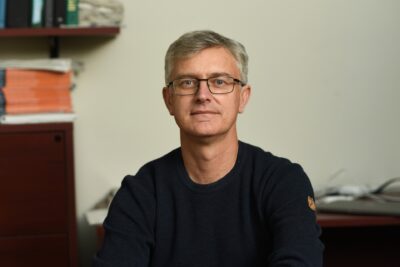CPSH Seminar: Galen Halverson
December 4, 2024
December 9, 2024 at 1:00pm CT
View Online: To view this seminar online, please email habitability@utexas.edu for a private YouTube link.
Speaker: Galen Halverson, James McGill Professor, Department of Earth and Planetary Sciences, McGill University
Host: Brandon Jones
Title: Geological Insights into the Nature of Early Eukaryotes
Abstract: One of the most compelling questions in science is how eukaryotic life emerged from its prokaryotic ancestors. It is widely accepted that eukaryotes originated via endosymbiosis between an archaeal host and a bacteria that closely resembled modern Alphaproteobacteria. However, the relatively recent discovery of the Asgard archaea and its identification as the closest archaeal relative to eukaryotes has reinvigorated the study of eukaryogenesis. While most of the rapid progress on this topic invariably falls within the realm of biology, the geologic record offers the potential for key insights into the timing and setting of eukaryogenesis, the morphology of early eukaryotes, and potentially the sequence of trait acquisition during the transition from the first eukaryotic common ancestor (FECA) to the last eukaryotic common ancestor (LECA). Impressively, molecular clock estimates and the fossil record broadly converge on a timing for eukaryogenesis of ca. 2.0–1.6 Ga. In this presentation, I will place the origin of eukaryotic life into the broader context of Earth’s geophysical and environmental evolution during the Precambrian, then present new results from drill cores in Australia that shed light on the age and environmental setting of the oldest tangible vestiges of eukaryotic life.
`Biography: Galen Halverson is a James McGill Professor, the T.H. Clark Chair, and the Department Chair of Earth and Planetary Sciences at McGill University in Montreal. He is a sedimentary geologist and isotope geochemist who studies diverse topics in Earth and Life history with a focus on tectonic, environmental, and biological evolution during the Proterozoic Eon (2500–539 million years ago). Specific topics of research include the Neoproterozoic snowball Earth, oxygenation of the Proterozoic atmosphere and oceans, and the origin and early diversity of eukaryotic life and its role in shaping the environment. His research is strongly field-based, and he has worked extensively on sedimentary basins across the Arctic and in southwestern Africa and Australia.

